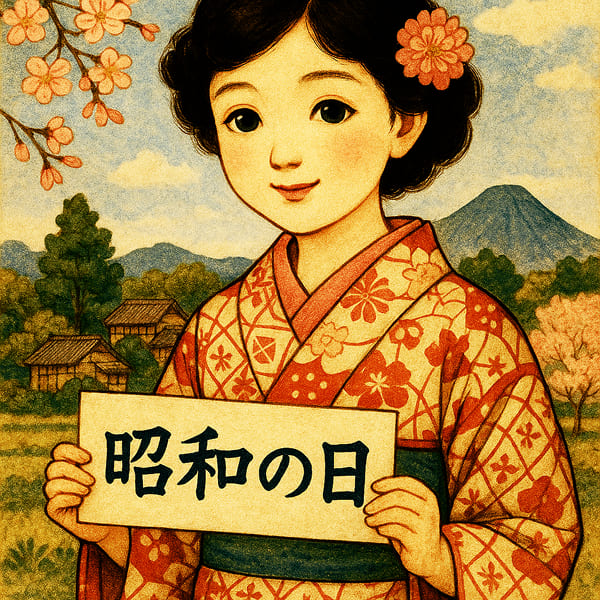Showa Day: Honoring Japan’s Transformative Era and Its Legacy

Imagine a nation rising from the ashes of war, rebuilding its cities, reinventing its identity, and emerging as an economic giant—all within a single generation.
This is the story of Japan’s Showa era, a time of profound hardship and dramatic transformation, spanning the reign of Emperor Showa (Hirohito) from 1926 to 1989.
Observed every year on April 29th, Showa Day (Shōwa no Hi) invites people to reflect on this turbulent yet formative era—one that shaped modern Japan through both devastation and determination.
As the first holiday of Golden Week, it marks not only a national pause for rest, but also a quiet moment of remembrance: a chance to consider how a country can endure, evolve, and rise again.
What Was the Showa Era?
The Showa period (1926–1989) encompassed some of the most pivotal decades in modern Japanese history. This era is remembered for:
- War and Reconstruction: The devastation of WWII and the nation’s rebirth under a pacifist constitution.
- Rapid Economic Growth: A dramatic recovery that turned Japan into a global economic powerhouse.
- Cultural Shifts: From traditional customs to high-tech urban living, society underwent massive change.
These decades represent both hardship and remarkable progress, offering important lessons in resilience, innovation, and adaptation.
The Origins of Showa Day
April 29th was originally celebrated as the Emperor Showa’s birthday during his lifetime. After his passing in 1989 and the start of the Heisei era, the day was renamed Greenery Day (Midori no Hi) to honor Emperor Showa’s deep appreciation for nature and his lifelong interest in botany.
Later, in 2007, the name was officially changed to Showa Day through an amendment to the Public Holiday Law. The revised law states that the purpose of the day is "to reflect on the Showa era, a time of dramatic upheaval and recovery, and to contemplate the future of the nation."
This marked a shift from a personal tribute to a broader national reflection on the legacy of an entire era. Today, Showa Day serves as a reminder for people to reflect on what the Showa era left behind—from the tragedies of war and times of hardship to economic success and sweeping social change.
Noted: Before the modern observance of the Emperor’s Birthday, the day was traditionally known as Tenchōsetsu, a celebration of the reigning emperor’s birthday. This custom dates back to the 8th century and became an official national holiday during the Meiji period. The specific date of celebration has always changed with each new emperor: during Emperor Showa’s reign, it was fixed on April 29th, while in the current Reiwa era, the Emperor’s Birthday is observed on February 23rd.
A small break — a little side note
Need a quick visual summary of Showa Day?
This short video explains the meaning, history, and cultural background of April 29th.
While the content overlaps with what you’ve just read, the visuals and narration make it easy to grasp the key points of Showa Day in just a couple of minutes.
Perfect for a quick recap or for sharing with someone new to Japanese culture!
The Start of Golden Week
While Showa Day holds deep meaning as a time to reflect on Japan’s past, it also plays an important role in the present—as the starting point of Golden Week, one of the most anticipated holiday seasons in Japan.
Golden Week includes several national holidays between late April and early May, during which many people:
- Travel domestically or abroad
- Visit family in their hometowns
- Attend cultural events or historical exhibitions
On Showa Day, museums and institutions often hold special programs related to the Showa era, offering opportunities to explore Japan’s modern history in engaging and meaningful ways.
In recent years, local communities have also embraced the day with nostalgic, family-friendly events that bring the spirit of the Showa era to life. One notable example is the annual event “Shōwa da yo! Zen’in Shūgō!” held in Sosa City, Chiba Prefecture. Visitors can:
- Play traditional games like kendama, paper balloons, and ohajiki
- Enjoy classic snacks such as ramune soda and dagashi (retro-style candies)
- Browse displays of vintage household items from the Showa period
- Dress up in retro clothing for fun, commemorative photos
For more details, you can visit the official event page (Japanese only) provided by the Sosa City Tourism Association.
These festive activities offer both older generations a chance to reminisce and younger visitors a playful window into Japan’s not-so-distant past.
A small break — a little side note
Step into a charming corner of the Showa era—through the sights and sounds of an old-fashioned Japanese dagashi-ya (penny candy shop).
This video takes you on a nostalgic journey through shelves filled with colorful snacks, toys, and the warm atmosphere of retro Japan.
Even today, Showa retro is making a comeback in pop culture, design, and tourism.
Curious what everyday joy looked like in 1970s or 80s Japan? This video captures the essence beautifully.
Why Showa Day Matters
More than just a day off, Showa Day serves as a quiet invitation to reflect—not only on Japan’s history, but on the enduring strength of a society that has faced immense trials and still chosen hope.
It reminds us that progress is not born overnight—it is shaped by persistence, resilience, and the ability to rebuild after loss. The Showa era, with all its complexity, offers powerful lessons about facing adversity with courage and moving forward with purpose.
In today’s fast-paced world, Showa Day encourages a pause—a moment to appreciate the journey of a nation that rose from ashes, embraced change, and carried its traditions into the future.
It is a day not only to look back—but to look ahead, inspired by where we’ve come from.